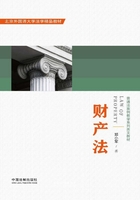
Chapter II POSSESSION AND FIRST ACQUISITION
The Principles
Possession:
1.A legal determination that a person owns personal property is difficult to make because proof of ownership of personal property is often not evidenced by a writing.As a result,the law puts great weight on the observable fact of possession.
2.To say that a person has “possession” of personal property is to state either an observable fact or a legal conclusion or both.A person can be deemed to have possession of property as a legal conclusion even though she does not have actual possession of the property as an observable fact.
3.To say that a person has “title” to or “owns” personal property is to state a legal conclusion.A person can be deemed to have title to property as a legal conclusion even though he or she does not have actual possession of the property as an observed fact.To conclude that a person is entitled to possession of personal property does not necessarily mean that the person has title to or owns the property.
4.Title,as all property rights,is a relative concept.A person may have “title” to property as against one person but not another.
5.If it is determined that a person is entitled to the legal possession of personal property,that person has the right to:
a) Continue the possession against everyone except those persons,if any,who have a better right to the property;
b) Recover the property if it is wrongfully taken; and
c) Recover damages to the property against a wrongdoer.
6.To constitute possession,there must be:
a) A certain amount of actual control over the property; and
b) An intent to possess the property and exclude others